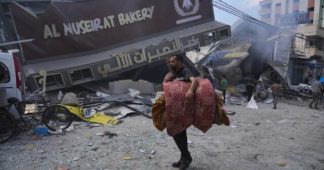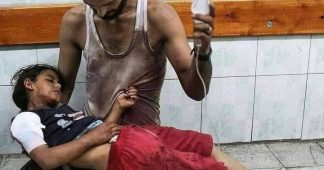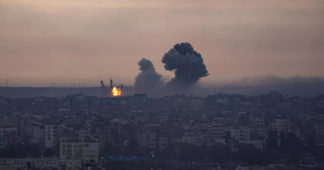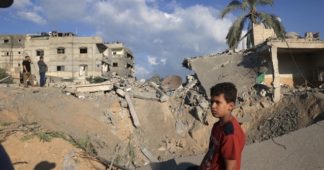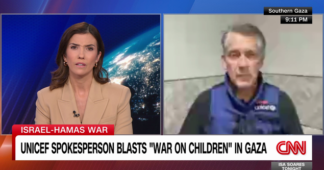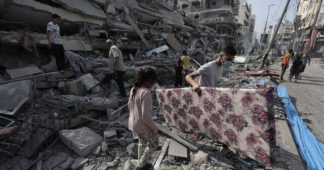Water and sanitation services are at the point of collapse with large-scale disease outbreaks looming, UNICEF warns
20 December 2023
Recently displaced children in the southern Gaza Strip are accessing only 1.5 to 2 litres of water each day, well below the recommended requirements just for survival, according to UNICEF estimates.
According to humanitarian standards, the minimum amount of water needed in an emergency is 15 litres, which includes water for drinking, washing and cooking. For survival alone, the estimated minimum is 3 litres per day.
Hundreds of thousands of internally displaced people, half of them estimated to be children, have arrived in Rafah since early December and are in desperate need of food, water, shelter, medicines, and protection. As demand continues to rise, water and sanitation systems in the city are in an extremely critical state. The resumption of hostilities, coupled with a lack of power supply, fuel shortages, restricted access, and infrastructure damage means that at least 50 per cent of WASH facilities are damaged or destroyed.
The impact of this on children is particularly dramatic because children are also more susceptible to dehydration, diarrhea, disease and malnutrition, all of which can compound to present a threat to their survival. Concerns of waterborne diseases such as cholera and chronic diarrhea are particularly heightened given the lack of safe water, especially following this week’s rains and flooding. Already, officials have recorded almost 20 times the monthly average of reported cases of diarrhea among children under the age of 5, in addition to increases of cases of scabies, lice, chicken pox, skin rashes and more than 160,000 cases of acute respiratory infection.
“Access to sufficient amounts of clean water is a matter of life and death, and children in Gaza have barely a drop to drink,” said UNICEF Executive Director Catherine Russell. “Children and their families are having to use water from unsafe sources that are highly salinated or polluted. Without safe water, many more children will die from deprivation and disease in the coming days.”
In shelters across the Strip, long queues of exhausted women and children wait to use the, on average, one toilet for every 700 people, pushing people to resort to other coping strategies, such as the use of buckets, or open defecation. Showers are even less available reducing hygiene options to nearly non-existent, impacting especially women and girls. This could further lead to an increase in the spread of disease.
UNICEF, with its partners, is providing fuel to operate wells, desalination plants, water trucking and waste and sewage management, bottled water and water containers benefiting over 1.3 million people with safe drinking water since the start of the crisis UNICEF has also distributed more than 45,000 jerry cans, more than 130,000 family hygiene kits, including menstrual health and hygiene products, and hundreds of thousands of bars of soap. Since the start of the crisis, UNICEF with partners, has reached over 189,000 people with hygiene supplies and more than 400,000 people with hygiene and sanitation services. During the humanitarian pause, UNICEF was also able to reach the northern Gaza Strip despite extremely challenging access conditions, and distributed 260,000 litres of water and 10,000 hygiene kits.
Generators to operate critical water and sanitation facilities, plastic pipes needed to provide short term repairs as well as construction material for rapid sanitation solutions are available at the Rafah border crossing, but are unable to cross into Gaza due to access restrictions imposed on such supplies, which are necessary to ensure minimum water and sanitation services critical for the survival of the people and children are restored.
“We are doing everything we can to meet the needs of the people in Gaza, but the equipment and supplies we’ve managed to provide are far from enough,” said Russell. “The constant bombing, along with the restrictions on materials and fuel allowed into the territory, are preventing critical progress. We urgently need these supplies to repair damaged water systems.”
UNICEF also continues to call for rapid, safe and unimpeded humanitarian access to all children and families in need, wherever they are, including to allow for the water and sanitation needs in the Gaza Strip to be addressed through the restoring and rehabilitation of existing infrastructure, and for all parties to adhere to their international legal responsibilities to protect water and sanitation facilities and workers entrusted to ensure maintenance and repair of these facilities.
We remind our readers that publication of articles on our site does not mean that we agree with what is written. Our policy is to publish anything which we consider of interest, so as to assist our readers in forming their opinions. Sometimes we even publish articles with which we totally disagree, since we believe it is important for our readers to be informed on as wide a spectrum of views as possible.
